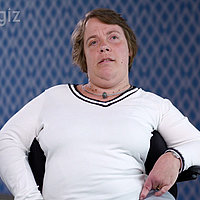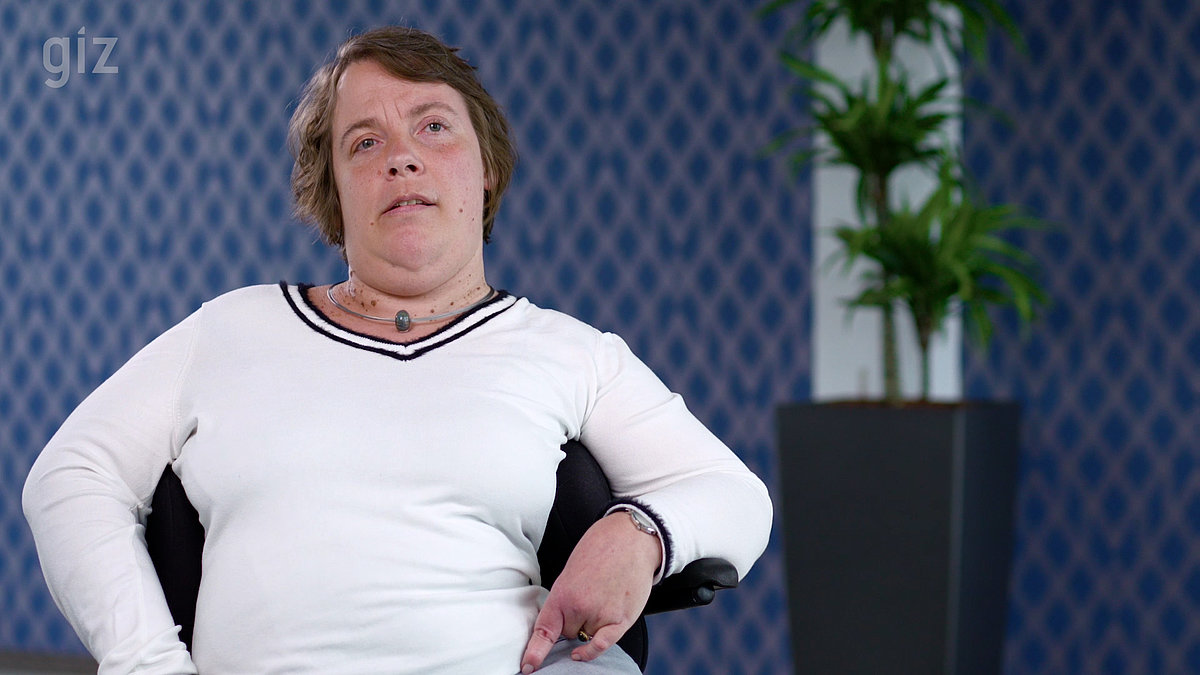Inclusion at GIZ
Our commitment to diversity
We are particularly committed to inclusion – and yet we still need to do better and make this an even stronger facet of our corporate culture. Our Declaration on Inclusion from 2016 already stressed the particular value of participation by employees with a disability. The Inclusion Agreement concluded in 2020 complements the Declaration and creates an even broader basis for appropriate measures. Our goal is to work towards equal opportunities, self-determined and equal participation in working life, and respectful relationships between colleagues.
Developing advisory capacity
Specific, visible measures include plans of action on accessible event management or guidelines on recruitment. In addition to this, in-house advisory capacities are being developed and staff in different departments are being trained as inclusion guides. An inclusion team made up of representatives from the participating bodies – the Inclusion Officer, Disabled Persons’ Representation, Staff Council and Human Resources Department – has already started work and will keep track of progress.

Interview with Helle Deertz
advisor on the Inclusion of People with Disabilities
Could you start by briefly introducing yourself please?
My name is Helle Deertz. I have been working in Bonn on the Inclusion of People with Disabilities global project for over four years. This global project, commissioned by the German Development Ministry, is responsible for ensuring that people with disabilities are included in German development cooperation on a more systematic basis.
What does inclusion mean within GIZ?
For GIZ, inclusion first of all means having an unequivocal attitude to this issue of including people with disabilities and then working towards it becoming a matter of course within the company. GIZ has already come a long way towards greater inclusion of people with disabilities and towards making it something that is a given in everyday life at the company. As an example: the Inclusion Agreement makes provision for inclusion guides to be established within the company.
What do these inclusion guides do?
The idea is that they advise staff and managers about programmes and projects addressing the subject of inclusion of people with disabilities at different levels and in different divisions. GIZ has also set itself the goal of training more people with disabilities with a view to making the company even more diverse. Inclusion always has to be seen as a process; it is simply a long journey during the course of which things can always change.
What has changed in recent years with regard to inclusion at GIZ?
I would definitely say that the awareness around inclusion is increasing all the time within the company and the issue is also taken into account more frequently. For example, there is a greater focus now on questions around accessibility when planning larger events. Of course, I would like to see even more examples of this positive change in practice. I would like it to simply become standard at GIZ, something that is considered always and not just for individual events. I would also like people to consult us on it frequently. Basically I have also noticed that there is more openness to the issue of inclusion in the company – not just in Germany, here in Bonn, Eschborn or Berlin, but also abroad in our partner countries.
You spent some time abroad working for GIZ – what was your experience of inclusion there?
I was in Guinea on a temporary placement as part of a basic education programme.
My colleagues became more open from week to week, with the support becoming a matter of course, offered not just by individual colleagues we worked with during things such as workshops but also by national staff. For me it was all very positive. It was a very nice experience that I am happy to pass on, including within the company here in Germany.
What changes would you like to see in future?
I would certainly like our company to employ more people with disabilities. That would make the company that bit more diverse and would therefore also contribute to our slogan: ‘Inclusion is the norm.’
Copyright: © GIZ / Tristan Vostry
Information on the following Sustainable Development Goals (SDGs) can be found on this page:

